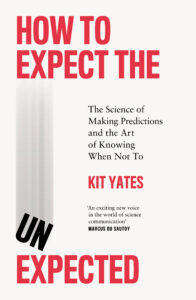Disclosure: I know Kit slightly, off the back of conferences and WhatsApp groups. I try to remain impartial in reviews, but you know, human biases. From here on, in the interests of neutrality, Kit will be known only as Yates.
At some point during the pandemic, Kit Yates‘s bushy beard (and the rest of his face) popped onto our TV screen and I said to the kids “oh! I know him!”
It seemed like every news broadcast for the next month was interrupted by shouts of “hey! That’s dad’s maths friend!” Someone they’d never noticed before was suddenly in their consciousness; they had become victims of the Baader-Meinhof phenomenon. Meanwhile, I suffered from linearity bias, fearing that this was going to be the case forever — lockdown would never end, and he would be eternally prevented from writing his book by having to go on telly and explain that COVID is a big deal, actually, to people suffering from normalcy bias.
If you’re not happy with the occasional, justified bit of sweariness, then this probably isn’t the book for you
Cards on the table, I’m a Yates fan. His style is all-clarity-no-bullshit, and apparently happy to argue his corner against all-comers. His first book, The Maths of Life and Death, I reviewed here previously; I expected his second to build from there. Which, given that it’s called How to Expect the Unexpected, gave me a slight worry that I’d fallen into a paradox.
Don’t worry. It’s good.
Of course I wasn’t going to miss a chance to mention the Baader-Meinhof phenomenon again, who do you take me for?
The premise is that humans are, by nature, not very good at prediction, but can be better (at least sometimes). We have evolved an ad-hoc collection of heuristics that have served us perfectly well up to now, thank-you-very-much — like the linearity bias of thinking things will continue much as they are, the normalcy bias of thinking it’s not worth moving camp just because Ug saw what might have been a tiger in the undergrowth, and the Baader-Meinhof tendency of paying attention to new things.
These are admirable starting points — but they’re nowhere near the whole story. A linearity bias lulls us into a false sense of security when a process is exponential; everything is absolutely fine until suddenly it goes very very wrong very very quickly. A normalcy bias means that we’re loath to evacuate a building that really is under attack by tigers.
The book gives us tools to overcome these biases, backed up with plentiful examples and supporting evidence. If I say “Bayes’ rule and basic game theory,” you’ll roll your eyes; practically every pop-maths book of the last few decades has covered both in depth. However, Yates doesn’t tackle them from the usual direction; his examples are fresh and shed a new light on them — for example, he doesn’t lead with the birthday paradox when he’s talking about a combinatorial explosion, he uses several different applications first.
He also looks at the limitations of prediction, for example in the face of feedback loops: if the chief of a bank publicly admits they’re in difficulty, it only makes the difficulty worse (a snowball); if an epidemiologist says “we need to lock down or we risk 500,000 deaths” and we follow their advice, we lose rather fewer people to the disease, making the forecast wrong (a boomerang).
Prediction (especially weather forecasting) is also cursed by people not understanding probability and by chaos; Yates gives a brief history of meteorology, from sailors’ tales to modern supercomputing, that puts these curses in context.
My main gripe with How to Expect the Unexpected is that it starts off a bit dense — it’s really hard to keep track of all of the biases, fallacies and effects introduced, rat-a-tat-a-tat, in the early stages. I was a bit uncomfortable with the first chapter, in which he visits (and gently misleads) a spiritualist; for all that I agree that spiritualism runs a gamut from self-delusion to outright fraud, it still felt a tiny bit mean-spirited.
Despite that, I enjoyed How to Expect the Unexpected as much as I expected to. Yates has good science, good jokes and good explanations, and I hope for all our sakes that his next book isn’t held up by bird flu or something.
- How To Expect The Unexpected is published by Quercus and due out in July 2023.


